Five Wabash alumni answer the question, "What's it like to coach at your alma mater?"
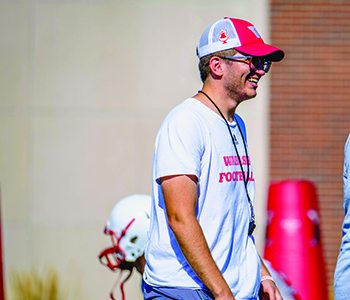 Assistant Football Coach
Assistant Football Coach
My father, Jeff Ramsey, was hired to coach at Wabash in February 2016. I knew I wanted to be a football coach, so my goal was to be a student coach wherever my father was. Both my parents coached at Oberlin College, and my dad’s dad was a football coach. I’m just following the bloodline.
Wabash is a football school. That makes it very fun to coach here. I am able to coach young men who are equally as smart in the classroom as they are talented on the field. These are great people who teach me as much as I teach them. They’re easy to brag about.
Another reason I keep coaching at Wabash is the coaching staff I work with every day. I learn so much from their vast experience and talent. Nobody outside my father has mentored me more than Olmy Olmstead ’04. Any time I have a question, thought, or idea, he is there to offer his thoughts and make me a better coach.
I try to be as consistent as possible. I try to think of the players first, bring new ideas to the table, and have fun with my guys. I like to emphasize concepts players can come back to over and over again. A lot of coaching football is getting guys to perfect thought processes and physical movements they are going to use thousands of times a year. If we can master those concepts, the score will take care of itself.
Coach Don Morell has helped me think about progressing up the coaching ladder as I get older. I’d like to coach with my father again before he steps away from the game. He has forgotten more than I have learned about football, and I constantly find new things to discuss with him. Having a father who is so happy just to be around football has inspired me to give coaching everything I have.
I became more empathetic throughout my years as a student-coach, especially since the coaching staff promotes post-graduate success over wins on the field. It became clear the importance of learning to respect the stories of the guys we coach.
The death of Evan Hansen ’19 in 2018 forced me to grow in ways I was not prepared for. It flipped a switch in my head relating to mental health that I had not even considered before. As coaches we see these guys every day during the season, but I never had a hint he was struggling. He was a captain, best player on our defense, and was loved by his teammates.
Evan’s death taught me everybody grieves differently. I’ve had players talk through problems with me, cry in my arms, and others just look tired in meetings. Regardless, being alert to changes in behavior and performance is something I need to consider to ensure these guys get the most out of their experience.
Coach Morel often reminds us after a tough loss if that’s the worst thing that happens to us, we will have lived a pretty good life.
Evan’s death was the worst thing I’ve had to deal with and it taught me a lot. I don’t wish anybody the pain we experienced as a campus after that.
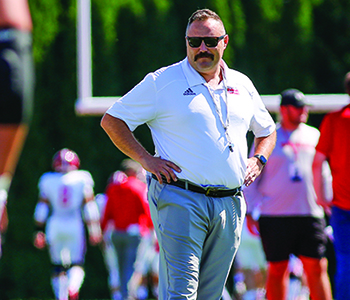 Assistant Football Coach
Assistant Football Coach
I really wasn’t interested in attending an all-male school. But I knew one of the coaches who worked here at the time, Nick Cronk ’91. I thought, If he’s coaching there now, and he went there, I’d better go take a look at this place. My father and I had lunch with Coach Greg Carlson and David Blix ’70. After, I received a nice handwritten note from Dr. Blix explaining why I needed to come to Wabash. That put me over the edge.
The classroom was a big part of what I learned at Wabash, but it was also fraternity life, clubs and organizations, Sphinx Club, and football. I learned how to have adult conversations, how to conduct myself as a responsible member of society, and how to contribute in ways I hadn’t thought of before. I learned a sense of confidence and empathy.
I spent a lot of time with History Professor Rick Warner H’13 and Classics Professor John Fischer H’70. Even though our viewpoints on many things were polar opposites, we had civil conversations. Doesn’t necessarily mean I changed my viewpoint. But certainly, understanding where people you care about come from was a big part of my growth.
One of the biggest differences in the Wabash that I knew as a student—versus the Wabash now—are internship opportunities with Career Services and the immersion programs. I wish I’d had an opportunity to participate in those. I strongly encourage students to participate in immersion courses and to visit Career Services frequently.
Initially I didn’t know if I wanted to come back to Wabash to coach. On the five-hour drive to interview, I decided if it wasn’t the Wabash I remembered, I wasn’t going to take the job. I had such a grand vision in my head of what my experience was as a student. I didn’t want to tarnish it.
After visiting some of the folks who were important to me as a student—Jim Amidon ’87, Sherry Ross H’04, Tom Runge ’71, and others—and meeting some of the student-athletes, I realized some of the buildings and faces had changed, but the spirit of Wabash had not, nor had the type of kid attracted to Wabash. We certainly have room for growth, but at the same time, we are continuing to honor and uphold the traditions that make Wabash what it is.
I’m fortunate my wife, Laura (Wysocki), works here too. She cares about Wabash the same way I do. She could teach anywhere in the country, but she chooses to use chemistry as her tool to educate men within our mission—in the same manner, with the same effort and enthusiasm, that I use offensive line play as my tool to educate men within our mission.
We like raising our daughter, Abigail, on this campus and in this community. Laura brings her to practice, and she gets to interact with my players. My offensive linemen get to see me in a different role, and Abigail gets to be around tremendous young men. The humbleness I see in the players is going to make them better dads, husbands, partners, and citizens.
Abigail can’t go to school here, so the next best thing, in my opinion, is for her to grow up here and still be a part of this community. She gets to grow in her own way surrounded by the people I care about, because they cared about me 20 years ago.
Giant men and women at Wabash had tremendous impact on my career. I’m not in that same category. I think about it every day when I get ready for work. I’ve got an obligation to the people who came before me, to honor them by doing the best I can all the time. Sometimes it goes well, and sometimes you fail. But “Wabash Always Fights” doesn’t just apply to touchdowns and tackles.
After being here for a decade, there’s a long list of guys I have coached for the duration of their career. I can tell you every one of their names and what they’re doing with their lives. It really is a lifelong friendship. You can never repay a kid for doing everything you’ve asked him to do to the very best of his ability, every time you ask him to do it. The only thing you can do is pay it forward and provide the next group of students the same experience.
But man, what am I doing sitting at this desk? This is the offensive line coach’s desk. This is where Paul Van Wie or Mark Jozwiak is supposed to be sitting. What am I doing here? It drives me to get better and improve, because I’ve got an obligation to those people. I’ve got an obligation to the current students and I’ve got an obligation to Coach Morel, who provides me with an opportunity to do this job.
The thing that impresses me most about our students is their willingness to do something hard and different than their friends are doing. There are still young men asking for a challenge. That is encouraging.
At some point, every guy who went to Wabash asks himself, What the hell am I doing here? But it’s all those arms, all those avenues of support around them, that continue to push them in the right direction. They can say for the rest of their lives, “Yep, I did that. I chose to do something harder than everybody else was doing.”
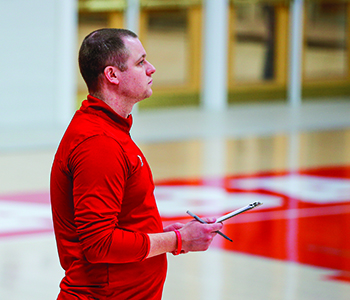 Head Volleyball Coach
Head Volleyball Coach
I grew up around wabash. My dad, uncle, and grandfather all graduated from Wabash, so I always knew what a special place it was. It was the only place I considered applying for college.
Prior to my return to Wabash, I had a great coaching job in New Orleans. I didn’t see myself leaving that position, but the thought of returning to a place I enjoyed so much and building a new program was too hard to turn down. I played on the club volleyball team at Wabash as a student, so coming back to coach the first season of the varsity program felt like a really unique opportunity.
Our students at Wabash balance so many responsibilities at once. Just about every player on our team is involved in at least one other campus organization, club, or activity. Many of our players are in leadership positions and they still manage to commit a great deal of time to improving on the volleyball court as well.
It’s been really fulfilling to see the personal growth in our players as they advance through the program and their four years at Wabash.
The most impressive thing about the coaching staff is the amount of time and energy everyone devotes to making sure our current student-athletes have a great experience, while continuing to recruit top level student-athletes from around the country. It’s not always easy to convince a high school student to come to a small, all-male, academically challenging school, but that’s what we all do every day.
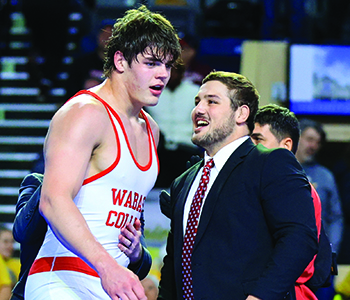 Assistant Wrestling Coach
Assistant Wrestling Coach
When I was a senior in high school, Coach Anderson came to one of my tournaments to recruit another kid on my team. Before that, I had no connection to the College. I came for my first visit in late February that year. I was focused on going to Olivet, an in-state school, but after visiting Wabash that changed. I was impressed with the facilities, the emphasis on academics first, and strong internship and job opportunities.
High school wrestling didn’t end the way I wanted, so I kept working hard and doing individual training sessions to get better. The good thing about our program is we attract the best. Our wrestling room is filled with great wrestlers. Being here for four years, surrounded by high-level athletes, it’s hard not to grow as a wrestler. I’m happy I stuck it out.
I had aspirations to continue coaching and figured I’d be back in Michigan at my high school. Coach Anderson reached out to me last summer and offered me the job. I jumped at the opportunity right away. I still wanted to compete and train. I knew the best thing for me was to coach. That would help me continue to grow personally while helping student-athletes and this program.
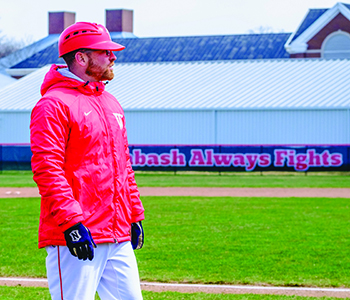 Head Baseball Coach
Head Baseball Coach
I was being recruited to play baseball by several small colleges in Indiana. I knew a couple of people from my hometown here at the time, Doug Marlow ’98 and Jason Pavey ’99.
The small class sizes and the intimate setting forced me to come to class prepared, and articulate my thoughts. I was a shy kid from a small town. I had great professors who challenged me academically but they were not going to let me fail.
Professor Bobby Horton was in his first few years as I was starting at Wabash. I loved his classes. Professor Todd McDorman was my speech professor. Rick Warner H’13 was another favorite of mine. Tobey Herzog H’11 was one of my earliest introductions to the College. Dan Rogers H’12 taught Cultures and Traditions. Melissa Butler H’85 was my advisor. She taught my freshman tutorial, Baseball in American Culture, which was my favorite class here. It was a cool class to introduce me to the College and study baseball in a way I hadn’t thought about it. I never changed my advisor because we had such a connection.
I feel very blessed to have taken classes from some legendary professors. A lot are still here. When I came back, I got to reconnect with them in a different way. When I first got back in town, I ran into Dr. Herzog. He said he kept my grades and looked them up. He said I did alright. It has been a really cool way to go full circle and reconnect with them.
My first job was as a graduate assistant at DePauw. This was a good way to introduce me to college coaching, while furthering my education. I was just part-time, but after my third year, they created a full-time assistant position. In 2010, I was interim head coach and then named head coach. I was there for a total of 13 years.
We were having a lot of success at DePauw so it was not an easy decision to leave there to come back to Wabash. We were at a different place as a program than Wabash was at that time. It was hard to leave a program where we were in a conference championship or national tournament every other year to go to a team that was hovering around or below .500.
As I was making my decision, I could see Wabash was a great environment to create a winning and championship program. I looked at the success Wabash was having in football and basketball. I watched what Coach Chris Keller was doing with the soccer program and Coach Brian Anderson with wrestling. I felt we could do the same with the baseball program. Dean of Students Mike Raters ’85 encouraged me to consider how great it would be to have an impact and build a legacy for the program.
I love the camaraderie of the coaching staff here. I’m always impressed how invested they are in the students’ successes on and off the field. They’re committed to running programs with integrity. The coaches fall in love with the College, just like I did as a student.
Academically, the baseball team got a 3.4 GPA last semester. The work they put into balancing academics and athletics keeps me motivated to come to work every day prepared. When you get a new group of high-character people in your program each year, it reinvigorates you to keep doing it.
We want to win our conference and make a run for the national championship. That’s standard. The bigger picture is creating an environment where we’re focused on individual and group development, providing an atmosphere where players are increasing their love for the game, and making it fun for them while working really hard and competing together. We also try to challenge them to understand the deeper layers of the game they may not have been considering in high school. It refreshes the game for them. My goal is when they leave here, they have a greater appreciation for the game and continue to want to be involved in the sport.
Tom Flynn was the head coach beginning my sophomore year. I developed a great relationship with him and have stayed in touch. We still connect and talk. I hope my guys can see me in that same way. You talk to guys in a lot of different phases of their lives, first job, first child. It’s exciting to hear from them. I just hope I can be a mentor for them the same way the professors and my college coach were for me—that they know they can call me at any point and I will have a conversation or help out in any way.